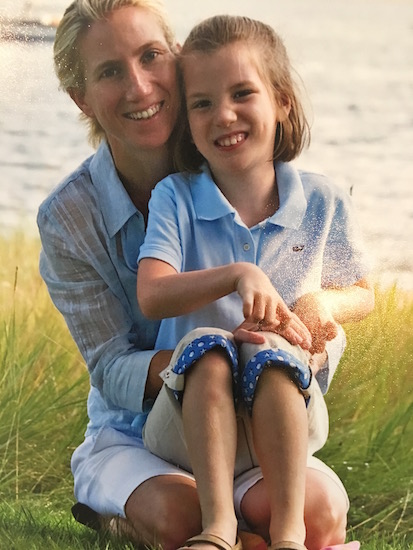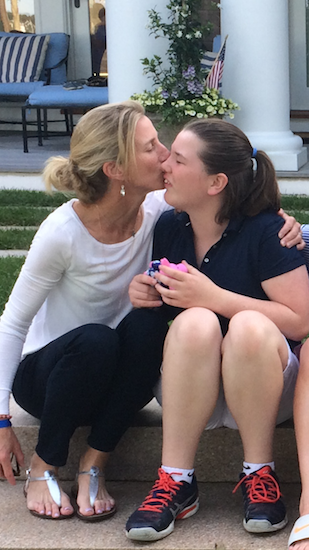What I Wish I Could Tell Myself on the Day My Daughter Was Diagnosed With Dup15q Syndrome
February 29 marked Rare Disease Day, an international effort to increase awareness of and support for individuals and families whose lives are affected by a wide range of extraordinarily unique diseases, disorders and syndromes.
It’s obviously a day with which you wouldn’t hope to be associated. Rare disease is just as it sounds — unusual, frightening, alienating. When you or your child receives a diagnosis, it may seem like the world shuts down for a time. You may wonder how this is possible, what lies ahead, how you will manage — if you can. And then slowly, one day leads to another, and you do. It would be nice if you could tell yourself this on the day of diagnosis.
Our 14-year-old daughter Erin was diagnosed with a rare chromosomal abnormality at 22 months. We had recently moved back to New York from London, where she and her younger brother were born. Today, this genetic condition is referred to as dup15q syndrome.

OK – breathe.
Yes, you heard right: Erin was diagnosed with something called dup15q syndrome. I know. That wasn’t in the realm of things we worried about. She has 10 fingers and 10 toes — but she also has an extra part of chromosome 15.
Yes, you heard right: developmental delays; autistic spectrum; speech, language and motor impairments. It confirms what you’ve been thinking since that first day. Something was off. It’s called hypotonia; it’s not that “she’s just a bit floppy,” as the general practitioner surmised when you expressed concern over her inability to hold up her head. So in a way, that’s a positive. Your instincts were right.
But I know you’re not feeling very positive right now. And that’s OK. It’s OK to take some time to process what the geneticist so clinically outlined. But don’t ignore it because you’re mad at him. Don’t space out and slip into denial. You heard him mention physical therapy, occupational therapy, speech therapy, early intervention. Get on that.
And do not dismiss that scary sounding therapy: applied behavior analysis (ABA) — just because the slideshow and presentation at the seminar make it look unusual. And don’t ignore the urging of the woman from the agency who suggests a home-based, 40-hour-a-week ABA program just because you don’t like the way she sits on your sofa and sizes up your mess. Do not dismiss her because you suspect she really just wants to get Erin out of the classroom. It’s ok. Let your guard down long enough to realize there are people out there who want to help Erin — and know how. Curt manner aside, this woman actually knows what she’s talking about. ABA will help. It’s not going to isolate her. It will draw her out of herself. She will learn to sit and to listen and to respond. She will learn to communicate.
At the same time, steel yourself. It will not be easy — it will be gut-wrenching to hear your 3-year-old daughter crying because she doesn’t have the words to say she just wants to sit on the floor and admire the ceiling fan. You don’t want her to go through life comfortable and happy only when she gets what she wants. And you do not want her to want that. ABA will take her a long way.
But when you feel she may have plateaued and you learn of new therapies, don’t torture yourself about leaving her team of teachers. They know how you feel — you can never thank them enough. But it’s OK to make a change. Be confident. You are the mom. And you’re a good mom.
Give yourself a break. Don’t feel guilty. Don’t blame yourself, and don’t blame your husband. Don’t blame the move to London or the cups of coffee. Don’t blame EU emissions standards. Do not blame Tony Blair.
Less than ideal things happen for no reason all the time. You know this. Don’t feel guilty. You did what you were supposed to. You took the vitamins. You avoided soft cheese. You may feel you did what you could to avoid something like this, you didn’t deserve this— but people don’t necessarily get what they deserve. They get what they get.
You get what you get, and you don’t get upset.
In a few years your son will skip home from preschool reciting this mantra. He will still get upset when he doesn’t get what he wants. And you can, too — for a short time. Then get on with it and realize that while this diagnosis feels bad, it is not the end of the world.
In fact, if you’re up for hearing it now, it will bring many positives — so many blessings.
This diagnosis will bruise but not break your heart, your family, your marriage. It will strengthen and enrich every relationship in your life. It will stretch your soul. But before you can begin to understand this, you have a lot of work to do — and so many exceptionally kind people to meet along the way. Some you have known all along, some you will know for only moments — but with a smile or a word they will remind you that you can do this. You can’t see them from here, from this awful chair in this awful office on this awful day — but they are out there waiting for you.
So get going and enjoy your daughter. Don’t focus on what she is not doing by the time she is “supposed” to be doing it. Celebrate what she does on her very own timetable.
Know she will learn to talk and to sing about the sun and the trees and how they dance in the wind.
She will learn to hug and to love.
Hug and love her back, and go home and hold your son. Hug him as much as you can and celebrate his milestones, too. You will be blessed with four very different children with unique personalities, interests and strengths. Don’t compare and contrast. Celebrate them. Listen to them. Learn from them.
This will not be an easy road — your sadness will be cyclical — but on the darkest days know that it will always abate, and the good and beautiful moments and people will far outweigh the bad. Have faith in this. Have faith in faith — and that Erin will one day teach you and all who cross her path what matters most: love and hugs — and
dancing trees.

The Mighty is asking the following: Write a letter to yourself on the day of the diagnosis. If you’d like to participate, please send a blog post to community@themighty.com. Please include a photo for the piece, a photo of yourself and 1-2 sentence bio. Check out our Submit a Story page for more about our submission guidelines.
